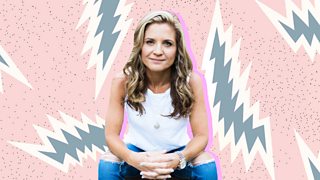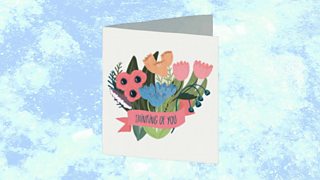The women who got us through 2020
It’s been a strange old year hasn’t it? Here at Woman’s Hour we wanted to celebrate some of the inspiring women whose advice, experiences and talent have just… well, basically, got us through it.
These are the women that helped us endure 2020, whether it was by helping us to process our emotions or to cook our dinner, telling it like it is or providing those water cooler TV moments to chat about (all while socially distanced and without the water cooler, of course)...
The 'most talked about on TV' women

We have watched a lot of TV this year, and we couldn’t do this round up without mentioning Normal People and I May Destroy You, two groundbreaking 91�ȱ� drama series which changed lockdown for many of us.
We spoke to , who plays Marianne in the TV adaptation of Sally Rooney’s novel Normal People, where the complexities of intimacy and young love are brought to life.
The show had everyone talking about sex, consent and relationships (and a certain gold chain, but we shall leave that to its social media fan accounts). Daisy told us why she was so proud of the sex scenes in particular.
“How refreshing to have a scene that is still incredibly tender and sexy, but yet it has this element of consent and using protection. It’s very awkward and clumsy. It’s everything that’s realistic about what actual relationships are like.”
Why did it resonate with us so much during lockdown? Well, author and podcaster Elizabeth Day summed it up perfectly: “It really spoke of alienation. These two people who love each other, and can only ever be their real selves with each other, and yet they can’t communicate. I think there’s something about that, because we are all in lockdown, that we really relate to. That kind of yearning for human contact and understanding.”
The other TV show that had everyone talking was Michaela Coel’s groundbreaking drama I May Destroy You, which she wrote and starred in as Bella, which tackled sexual assault and the millennial relationship between feminism and consent.
Poet and fan Vanessa Kisuule told us: “It’s not afraid of moral conundrums, of acknowledging there’s no such thing as the perfect victim or the whole evil perpetrator. With 90’s feminism, we’ve been fed a lot of stuff about, ‘Girl, do your thing. Go have lots of sex. Be free…’ and we haven’t really examined the inevitable quandaries that come with that.”
Weruche Opia who played Terry, Bella’s best friend, told us she was “blown away by how frank, raw and real Michaela was.”
And we have to mention the scene featuring period blood.
“I screamed when I saw the blood clot,” said Zing Tsjeng, executive editor of Vice UK. “I think it’s almost sad that in a decade where we’ve seen more men and women get murdered on screen it takes a blood clot to make someone like me sit up and take notice and say, ‘I have never seen that before’. That is genuinely radical and new and refreshing.”
The foodies
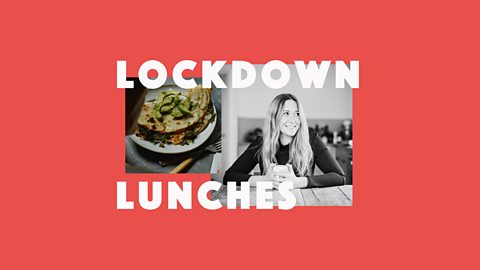
Lockdown lunches with Anna Jones
Vegetarian cook Anna Jones shares three of her quick and easy go-to lunches.
We thank our lucky baba ganoushes that these women were around to help inspire us, as we seemed to be cooking endlessly this year. When we couldn’t face yet another pesto pasta they had our backs with their Cook the Perfect… recipes.
We had lockdown lunches with veggie cook Anna Jones, who saved us all from our sad sandwiches by sharing three of the quick and easy 'go-to' lunches that kept her family fed. Her super quick egg-sandwich-tortilla recipe was a game changer!
Nigella Lawson got the nation reassessing the humble fish finger when she cooked the perfect Fish Finger Bhorta - a hot, sharp, sweet and sour dish which she described as “comforting and enlivening”. She reminded us that dinner time food can be “a promise of pleasure everyday and a moment away from the whirlingness of the world outside.”
And Chef Ravinder Bhogal had us almost in tears with her thoughts on proudly inauthentic immigrant cuisine.
“The food of immigrants is the food of people who have the ache and longing for what they’ve left behind, but also the wonder at their new landscape. It’s when they reconciled those two things that they create a completely new cuisine which is always proudly inauthentic.” Her Perfect Coffee Rasgullas with Mascarpone Ice Cream and Espresso Caramel could be the perfect way to eat through all those emotions.
Our emotional crutches
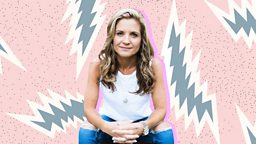
We also have to thank the women who became our emotional guidance counsellors, sharing strong advice to live by.
We had a masterclass on coping emotionally with coronavirus from psychotherapist Julia Samuel. She told us to: “Be as self-compassionate to yourself as you would a friend.” Other golden advice included: “Say what you feel honestly to someone you trust and feel warmth for” and, “When you feel powerless, helping others is the most powerful antidote”.
Bestselling author, Glennon Doyle, urged us all to “stop pleasing others and start living”. She shared this advice on how we can all become our true selves, and why lockdown was “forcing people to look at that stuff”.
“It’s like we’re those snow globes - we keep ourselves shaken up so we don’t have to see the truth in the centre, and this time really feels to me like it’s a forced settling of the snow globe. I think a lot of people are looking right in the eyes things they may never have looked at. That might cause some real transformation as we come out of this.” Read Glennon Doyle: How to reclaim the true you.
Black Lives Matter
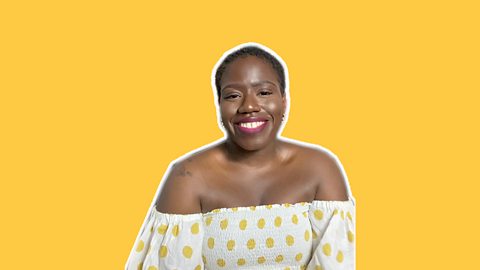
Candice Brathwaite: I wasn't seeing my version of motherhood reflected
Author and blogger Candice Brathwaite on sharing her story as a black British mother.
There was a moment in 2020 when the world stopped, when we heard George Floyd’s last words, “I can’t breathe”. He was killed by a white Police officer while in custody. The silence created by the pandemic allowed the voices of black women and men to be heard, and saw the resurgence of the Black Lives Matter movement with protests across the globe.
We spoke to several women who’ve been standing up and making a difference in the UK.
Blogger turned author Candice Brathwaite shared her experience of being a black British mum. She told us how she wasn’t seeing her version of motherhood in any of the books she read, so she wrote one herself. In I Am Not Your Baby Mother she talks about her fears around raising her son because of the judgements people make about black boys, who are “more likely to have very stereotypical negative things put upon them as soon as they go from being a ‘cute toddler’ to ‘a child with a lot of spirit’.”
Questions about black and ethnic minority doctors, nurses and other healthcare workers with the NHS were also raised due to the pandemic. They were disproportionately affected by the virus both in infection rate and mortality. Carol Cooper, a Regional NHS Head of equality, diversity and a Registered Nurse, said the UK needs to face up to the issue of race, instead of ignoring it.
“Owning racism, and accepting it is a real phenomenon, is really important in our journey towards supporting individuals who live in the environment of racism,” she told Woman’s Hour.
“Work needs to take place to support people to be able to, one, heal from the impact and, two, to be able to offer voice and agency in that space.”
She said seeing the Black Lives Matter protests made her feel hopeful: “There was an understanding, a unity, an empathy that I had never witnessed in my lifetime.”
Our Woman's Hour listeners

Throughout this year our listeners have helped shine a light on what life has been like for women in 2020. We’ve heard about , what it feels like to to reach the age your mum was when she died and even about your .
And you revealed your deepest thoughts and feelings about the reality of life in lockdown for our series The Woman’s Hour Corona Diaries. Elaine from Brighton shared her experience of grieving without the physical presence of friends and family.
Annie in Sheffield inspired us to turn those ridiculously long WhatsApp chats into haiku. Fran from Sheffield explained how growing veg helped her cope and 21-year-old Elizabeth from Cornwall talked about swapping her dream job on a cruise ship for life back home on a dairy farm.
Broadcasting legends

They’ve steered the good ship Woman’s Hour through a pandemic, but 2020 also meant time to say goodbye to two of our presenters.
After 12 years on the programme, Jane Garvey will broadcast her final show on 31 January, when she’ll look back at the women she’s enjoyed interviewing the most. And Jenni Murray, the show’s longest running presenter at 33 years, said farewell in October.
Jenni revealed her most terrifying interviewee was Margaret Thatcher - not that fear stopped her from bringing up how François Mitterand complimented Thatcher’s Marilyn Monroe lips and Alan Clark was attracted to her ankles. “Did you flirt if you had to?” Jenni asked and Thatcher replied aghast, “I didn’t even know they had made these comments… How should I?”
She signed off her last ever show with feminist anthem I Am Woman by Helen Reddy and the words: “It’s goodbye from me. Thank you all for listening and being such a vital part of the Woman’s Hour family.”
Join us live on Radio 4 from 10am on 4 January 2021 as our new presenter Emma Barnett takes the Woman’s Hour mic, or catch up whenever you like on 91�ȱ� Sounds, where you’ll also find all the episodes you may have missed. Follow us on and on and join the conversation….

